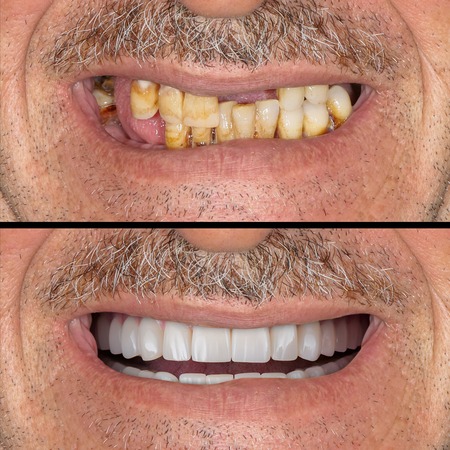Dentures & Partial Dentures
Traditional dentures are removable dental appliances for missing teeth. They are made to closely resemble your natural teeth and may even enhance your smile.
There are two types of dentures – complete and partial dentures. Complete dentures are used when all of the teeth are missing, while partial’s are used when some natural teeth are missing. A Partial denture not only fills in the spaces created by missing teeth, it prevents other teeth from shifting.
A Complete denture may be either “conventional” or “immediate.” A conventional type is made after the teeth have been removed and the gum tissue has healed, usually taking 4 to 6 weeks. During this time the patient will be without the missing teeth. Immediate dentures are made in advance and immediately placed after the teeth are removed, thus preventing the patient from having to be without teeth during the healing process. Once the tissues shrink and heal, adjustments will have to be made.
Dentures are very durable appliances and will last many years, but may have to be remade, repaired, or readjusted due to normal wear and tear.
Why get Dentures?
- Complete Denture – if you are missing all the teeth in an arch.
- Partial Denture – if you are missing some teeth in an arch.
- To improve and enhance your smile.
- To improve your ability to chew and digest food.
- To improve your speech – if missing teeth are causing issues.
How long will it take to get Dentures for the first time?
The process of getting dentures requires several appointments. Highly accurate scans are taken using our state of the art 3D scanners, and we send those to the lab for them to create your custom denture. Several “try-in” appointments may be necessary to ensure proper shape, color, and fit.

At the final appointment, Dr. Tomar or Dr. Patel will precisely adjust and place the completed denture, ensuring a natural and comfortable fit.
It is normal to experience increased saliva flow, some soreness, and possible speech and chewing difficulty when you start wearing your dentures, however this will subside as your muscles and tissues get used to the new dentures.
You will be given care instructions for your new dentures. Proper cleaning of your new dentures, good oral hygiene, and regular dental visits will aid in prolonging the life of your new dentures.



